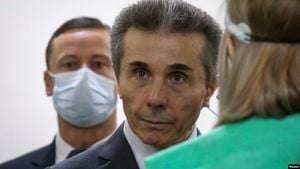Canada's political climate has just taken another tumultuous turn with the sudden resignation of Finance Minister Chrystia Freeland. Her departure from the cabinet, announced on December 16, 2024, has immediately sent shockwaves through the already shaky minority government led by Prime Minister Justin Trudeau.
Freeland's resignation appears to have stemmed from deep-seated disagreements with Trudeau, particularly about how to address impending tariffs from the incoming U.S. administration under President Donald Trump. The finance minister stated plainly, "For the past number of weeks, you and I have found ourselves at odds about the best path forward for Canada," indicating not only personal differences but fundamental disputes over policy direction.
On the eve of presenting the government's fall economic statement, Freeland shared her resignation via social media, emphasizing the erosion of support she felt from the Prime Minister. Her letter included pointed remarks about her lost authority, stating, "To be effective, a Minister must speak on behalf of the Prime Minister and with his full confidence." This candid acknowledgment has sparked widespread speculation about the future leadership dynamics within the Liberal Party.
Freeland's abrupt exit has led to intensified calls for Trudeau to resign. Politicians across the spectrum were swift to respond, with NDP leader Jagmeet Singh declaring, “They’re fighting themselves instead of fighting for Canadians." Even within Trudeau's own party, pressure is mounting. At least twenty-four Liberal MPs, led by Ontario's Chad Collins, signed letters demanding the Prime Minister step down. Collins remarked, "Today, I publicly reiterate my request to the Prime Minister to step down and initiate a leadership process to take our country in a new direction."
The departure of Freeland, who has been at the forefront of Canada's economic strategies since her tenure began, raises numerous questions about the future capabilities of the Trudeau administration, which has seen its approval plummet from 63% to 28% since taking office. The repercussions of Freeland’s resignation were immediately felt, prompting Conservative Party leader Pierre Poilievre to urge for federal elections. He expressed the sentiment among many Canadians, saying, "The Government of Canada is spiralling out of control."
Adding weight to the calls for change, former Justice Minister Jody Wilson-Raybould tweeted, “When the general is losing his most loyal soldiers on the eve of a (tariff) war, the country desperately needs a new general.” Public discourse on platforms like social media is awash with sentiments echoing the dissatisfaction felt by constituents, with tweets stating, "Justin Trudeau's resignation would be a pretty great Christmas present for Canada."
Meanwhile, Ontario Premier Doug Ford characterized the situation as "chaos" within the capital. His comments reflect the growing sentiment of dysfunction among government ranks, casting doubts on Trudeau's capability to navigate Canada's political and economic challenges effectively. Following Freeland's resignation, it was revealed the government is facing a staggering deficit of $61.9 billion, confirming fears of financial mismanagement as outlined by economists.
Immediate changes to cabinet followed Freeland's resignation, with Public Safety Minister Dominic LeBlanc slated to take over the finance portfolio. This swift decision affirms Trudeau’s intention to maintain stability, yet many doubt whether these changes are enough to restore confidence among Canadians and party members alike.
Freeland’s supporters within her party expressed their shock at her resignation, particularly Minister of Transport Anita Anand, who spoke through teary eyes about the emotional weight of the news. Meanwhile, political analysts have been quick to describe Freeland's decision as indicative of the broader issues facing Trudeau’s government, with CTV News’ political commentator Lori Turnbull stating, "This is a disaster for the government.”
The recent upheaval creates uncertainty not just for the ruling party but raises questions over the economic stability of Canada. Freeland's departure, following her pivotal role during the pandemic, shifts the spotlight to LeBlanc and his ability to lead at such a fraught time.
With provincial leaders and MPs openly questioning the Prime Minister’s grip on power, Canadians are left wondering if this political disruption will spark significant changes before the next federal elections. The opposition parties, including the Conservatives and NDP, are commanding the narrative and urging for immediate electoral action to address what they see as pivotal crises within the current administration.
The atmosphere of discontent among the Liberal caucus appears to be growing more pronounced. Political insiders suggest Trudeau is weighing his options, and some speculate he may even contemplate proroguing parliament as he assesses his position. Trudeau has remained publicly committed, asserting his dedication to the role, but many doubt his ability to recover the lost trust.
Freeland’s resignation marks not just the exit of a key figure from Trudeau’s cabinet but signals the potential dawn of significant changes within the Canadian political framework as the country grapples with both economic and leadership instability. For many, the question now extends beyond Freeland's resignation to whether Trudeau can hold onto his leadership or if he'll soon join her on the sidelines of political history.
How will this reshuffling impact Canada’s political stability? Only time will tell as the nation awaits the government’s next steps, especially as potential economic threats loom from the United States under Trump's administration.



